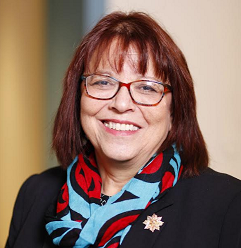I can’t think of a better metaphor for the need for respectful visibility of Native people in America than the Washington football team’s announcement that it changed its name to the Commanders—on Groundhog Day.

At the American Indian College Fund, we are relieved that the Washington team has finally changed its former offensive name. We are deeply thankful for the tireless work Native advocates and allies have done over the years to get the team to this point. But like the movie Groundhog Day, in which the protagonist is stuck in a time warp where every day is the same day and events repeat themselves, every day in Indian Country there is more work to be done eradicating racist mascots and place names. And each day at the national, college and university, and K-12 school levels, we are met with the same arguments and the same resistance.
Want more Native News? Get the free daily newsletter today.
This important work needs our support because research shows racist mascots harm the self-image of children and have a negative impact on their education performance. We must continue to eradicate racist mascots and place names that fetishize Native people once and for all.
We urge you to join us as we lend our voices to our Native allies and sister organizations in calling for an apology from team owner Dan Synder. An apology acknowledges harm, and there is no doubt that Native people, especially our children, were and are harmed by mascots which dehumanize and exploit us. We also encourage the Washington Commanders to consider how they can mediate the harm done (harm which continues to be done until they publicly acknowledge that harm) by providing educational support, mentoring, and internships for Native students. When we are on the football field, in the front and back offices of sports teams, and are respectfully represented in marketing, we will make headway to healing some of the harm that has been done.
Cheryl Crazy Bull (Sicangu Lakota) is the president and CEO of the American Indian College Fund
Help us defend tribal sovereignty.
At Native News Online, our mission is rooted in telling the stories that strengthen sovereignty and uplift Indigenous voices — not just at year’s end, but every single day.
Because of your generosity last year, we were able to keep our reporters on the ground in tribal communities, at national gatherings and in the halls of Congress — covering the issues that matter most to Indian Country: sovereignty, culture, education, health and economic opportunity.
That support sustained us through a tough year in 2025. Now, as we look to the year ahead, we need your help right now to ensure warrior journalism remains strong — reporting that defends tribal sovereignty, amplifies Native truth, and holds power accountable.
 The stakes couldn't be higher. Your support keeps Native voices heard, Native stories told and Native sovereignty defended.
The stakes couldn't be higher. Your support keeps Native voices heard, Native stories told and Native sovereignty defended.
Stand with Warrior Journalism today.
Levi Rickert (Potawatomi), Editor & Publisher
